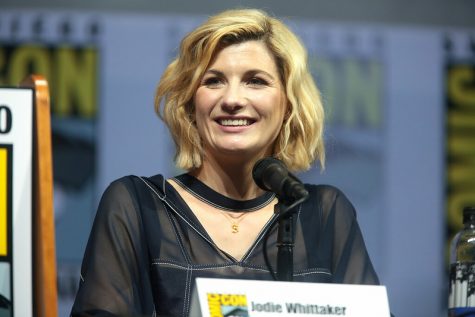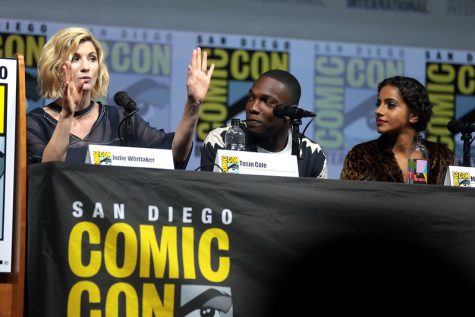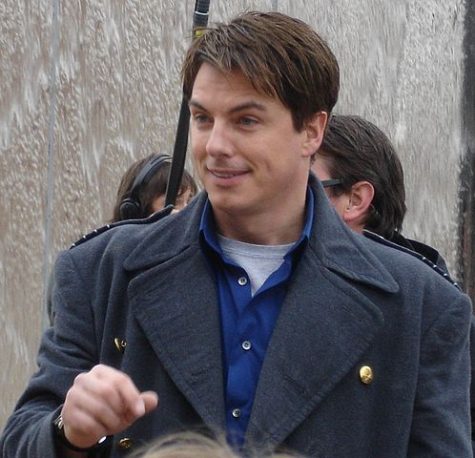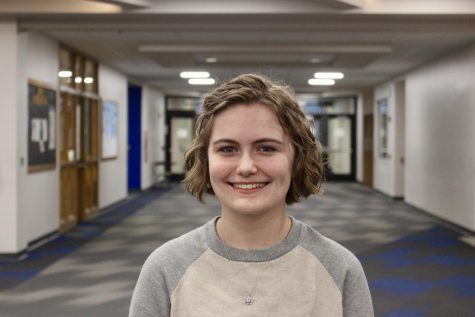“Doctor Who”: the latest season was mind-blowing, but does it stand up?
April 4, 2020
Anyone who has seen the latest season of “Doctor Who” knows that it was a wild ride. Not only did several old villains make surprising comebacks, the entire lore surrounding the show was practically upended.
The season before this one was great. A huge part of its success was due to the fact that it introduced Jodie Whittaker as the latest incarnation of the Doctor.

“Doctor Who” actor Jodie Whittaker speaking at the 2018 San Diego Comic Con. https://creativecommons.org/licenses/by-sa/2.0/legalcode / No modifications made.
The Doctor is a Time Lord— an alien race that likes to travel in space and time. When a Time Lord’s body begins to die, they regenerate. In an explosion of energy, they get a new body, still sporting the same brain and personality (although with some different quirks and a new catchphrase).
Because of the steadily shifting cast, devotion of its fans, jaw-dropping plots, and seasons engineered to attract new viewers, the show has lasted for nearly 60 years.
If you want a quick and more in-depth introduction to the show, these links are pretty good: link 1 & link 2.
It has been canon for a long time that a Time Lord can regenerate into a new gender. However, since the show’s initial creation in 1963 and its reboot in 2005, there had never been a female version of the Doctor. That is until season 11.
In July 2017, the BBC announced that Jodie Whittaker would portray the 13th regeneration of the Doctor. Whovians (fans of the show) were ecstatic. Many cried tears of joy, including me. (Nerds.)
These tears reappeared on Oct. 7, 2018, when Whovians saw her in action for the first time. The season’s first episode was viewed by 10.96 million people, making it the highest rated debut episode in the show’s nearly 60-year history.
Whittaker just radiates power and confidence, as do the other female characters of the show. This power was best seen in series 11’s third episode, “Rosa”, as The Doctor and her companions try to stop a time-traveling criminal’s attempt to erase the courageous acts of Rosa Parks (Vinette Robinson) from history. At the episode’s end, The Doctor says that, even though the world didn’t change very quickly, Parks changed the whole universe with her one act of courage.
This episode in particular embodies what the show is: a fight for justice and equality against evil, empowering girls and boys alike, showing them that they can have a positive effect on the universe if they work at it.
There were many new aspects, like the companions: three humans from Sheffield, who the Doctor calls her “fam.” Yaz (Mandip Gill), Graham (Bradley Walsh), and Brian (Tosin Cole) are a diverse and humorous bunch with some interesting and amusing relationship dynamics.

“Doctor Who” actors Jodie Whittaker, Tosin Cole and Mandip Gill speaking at the 2018 San Diego Comic Con International
https://creativecommons.org/licenses/by-sa/2.0/legalcode / No modifications made.
Despite all the change—with the upgraded TARDIS, sonic screwdriver, companions, and Doctor— it still felt like the show I fell in love with four years ago when I watched the entire season in one day when I was sick and bored at home on a school day. In fact, it renewed my love for the show and felt more like classic “Doctor Who” than the show had for a long time.
Basically, this version of the Doctor was everything I had ever wanted “him” to be. The only thing I was worried about was whether “Doctor Who” has reached its full potential. It seemed like the show couldn’t ever surpass what it had already accomplished.
This latest season may have proved me right.
Series 12 started on a pretty good note—a two-part story that involved going back in time and meeting Ada Lovelace as well as some spy/James Bond stuff. Most importantly (to the lesbians) Jodie rocked a suit. And, of course, it ended with a bombshell that set up the overlying plot of the season and kept me coming back to figure out why it happened.
Honestly, the whole season was good. Every episode felt like classic “Doctor Who”. Plus it seemed to give fans everything they wanted. However, compared to the success of the previous season, this one had pretty sucky ratings.
My favorite episode was probably episode four, “Nikola Tesla’s Night of Terror”. That’s not surprising given my affinity for anything history or Nikola Tesla-related. Not only did he get to help save the day, it highlighted the rivalry between Tesla and Thomas Edison without demonizing the more successful businessman (which is something I didn’t know I needed until now). Plus, they ended up finding common ground and left with more mutual respect for one another. Goran Višnjić played Tesla and Robert Glenister played Edison and, while neither actor bears a striking resemblance to their subject, both did well at evoking the qualities of one of my favorite and one of my least favorite historical entities.

John Barrowman reprised his role as Captain Jack Harkness in season 12. https://creativecommons.org/licenses/by-sa/2.0 /No modifications made.
One would think that the next episode, “The Fugitive of Judoon”, would’ve been my favorite, given that Jack freaking Harkness (John Barrowman!) is in it! But they didn’t spend much time on that. And he didn’t even get to reunite with the Doctor; all he did was tell the companions to give her a message that I fail to see why he would have known about in the first place. I was elated when he was in the episode but was overall left feeling frustrated and unfulfilled.
Not to mention the actual plot of the episode was kind of confusing and ended with another bombshell that ties back into the mystery of the original bombshell. However, even after the season finale, there is still no closure. But, given that this is “Doctor Who” we’re talking about, I’m sure it will all (sort of) make sense next season. Or maybe the one after that.
Another great episode for me was “The Haunting of Villa Diodati” which has Mary freaking Shelley (Lili Miller) in it! On the night she was inspired to write Frankenstein! I mean… think about the irony of that! An episode of one of the most iconic sci-fi shows of all time featuring the creator of science fiction the night she creates it! Brilliant!
This episode would have beaten out Tesla’s episode for my favorite if it weren’t for it being a stepping stone for the season’s overlying plot. I’m just a little disappointed that they took a concept that could have been a stand-alone episode and made it part of the big picture. Also, spoiler alert, it changes the whole scary-story-contest idea that led to Mary writing her most famous novel. Not only that but it even changes the reason for the Year Without a Summer (which is a really cool story if you want to check it out).
I’ve always enjoyed the story of the circumstances leading to Mary Shelley writing “Frankenstein”. The idea of a massive volcanic eruption on the other side of the world causing the series of events that resulted in a bored teenage girl writing one of the most iconic books in history is really cool. Also, it would have been way cooler if, instead of changing history, this episode had gone with it, of course adding a few twists. Like, perhaps, they had to stop a time-traveler who wanted to change history? Or there was something weird with the volcano? Or, better yet, something with ghosts… that are actually aliens… because that hasn’t been done before… ehhh.
Also, remember how I said Ada Lovelace was in the first episode? Well, Lord Byron was her biological father… and he was in “The Haunting of Villa Diodati” since he was, you know… there. And he was the one who came up with the idea for the writing contest in the first place. So… they missed an opportunity to do something with that. That’s kind of how I feel about the whole episode—wasted potential.
I’m probably in a minority with my thinking here. I just really like the original story and I would have liked the episode to have been more focused on Mary than the overlying plot of the season.
The two-part finale was absolutely insane. In a good way though. It completely up-ends everything that even the Doctor knew about her world and the several decades of lore surrounding the show and I. Am. Here. For. It. My only complaint is that it ends on a crazy cliff-hanger… which is definitely more of a me-problem. If the point of the cliff-hanger was to build anticipation for the upcoming special, it certainly did the trick!
I know some people are unhappy with this season but, in my opinion, it’s fine. Better than fine. Compared to the writing in the Capaldi era (they did him dirty and I’m still salty), the last two seasons have been extremely refreshing. The overall plot of the season was mind-blowing but made sense. The individual episodes, although sometimes preachy, had good messages and riveting story-lines. Thumbs up!
I don’t know that it was better than the last season. That one gave me the feelings of novelty and excitement that will probably make it my favorite for years to come.
Now, as for the hole “altering the entire history of the Time Lords” thing, I thought it was pretty cool. “Doctor Who” has always been notorious for its mind-freaks and, for me, this one is no different. Better yet, it made sense! It was thought-provoking and interesting and exciting. Plus, it uncovers so many possibilities and unanswered questions that could drive several new seasons.
For me, “Doctor Who” isn’t something I would normally rate. It doesn’t feel like an ordinary show. I mean, it’s been around for almost 60 years, has an enormous fan base, and exuberant lore. At this point, it has grown beyond being a mere show. It’s more of a force… like the weather. And people don’t usually rate the weather. They simply experience it. They get through the droughts and wait for the nice weather. That’s what I do with “Doctor Who”. And, at the moment, it’s lovely.
But, since this is actually a review, I will rate it. And that rating is… 9 Wibbly Wobblies out of 10 Timey Wimeys.
The views in this column do not necessarily reflect the views of the GENESIS staff. Reach Abigail Gratzol at [email protected].







